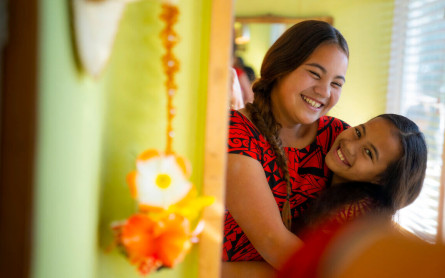
Planning & budgeting
Saving & investing
KiwiSaver
Tackling debt
Protecting wealth
Retirement
Home buying
Life events
Setting goals
Money tracking
Plan your spending with a budget
Getting advice
Studying
Get better with money
What pūtea beliefs do you have?
How to build up your emergency savings to cover unexpected costs
How to save your money
How to start investing
Find a financial adviser to help you invest
Your investment profile
Compound interest
Net worth
Types of investments
Term deposits
Bonds
Investment funds
Shares
Property investment
How KiwiSaver works and why it's worth joining
How to pick the right KiwiSaver fund
Make the most of KiwiSaver and grow your balance
How KiwiSaver can help you get into your first home
Applying for a KiwiSaver hardship withdrawal
How to use buy now pay later
What you really need to know before you use credit
How to get out of debt quickly
Credit reports
Know your rights
Pros and cons of debt consolidation
Credit cards
Car loans
Personal loans
Hire purchase
Student loans
Getting a fine
What happens if I start to struggle with moni?
How to protect yourself from fraud and being scammed
About insurance
Insurance types
Insuring ourselves
Wills
Enduring powers of attorney
Family trusts
Insuring our homes
Losing a partner
Redundancy
Serious diagnosis
How to cope with the aftermath of fraud
Separation
About NZ Super – how much is it?
When you’re thinking of living in a retirement village
How to plan, save and invest for retirement
Manage your money in retirement
Find housing options in retirement
Four approaches to spending in retirement
Planning & budgeting
Saving & investing
How to build up your emergency savings to cover unexpected costs
How to save your money
How to start investing
Find a financial adviser to help you invest
Your investment profile
Compound interest
Net worth
Types of investments
Term deposits
Bonds
Investment funds
Shares
Property investment
View all
KiwiSaver
Tackling debt
How to use buy now pay later
What you really need to know before you use credit
How to get out of debt quickly
Credit reports
Know your rights
Pros and cons of debt consolidation
Credit cards
Car loans
Personal loans
Hire purchase
Student loans
Getting a fine
What happens if I start to struggle with moni?
View all
Protecting wealth
Retirement
Home buying
6 March 2024
Reading time: 4 minutes
Posted by Elizabeth O'Halloran,
1 comment

We always want things to be easier or better for our tāmariki, which is why so many of us work hard to give them the opportunities we didn’t have.
But how many of us are teaching the next generation about financial capability, skills that can pave the way to financial independence and a better future?
Financial capability is an especially important skill for girls. Women continue to earn less than men, live longer and often have careers breaks impacting their finances. Learning about money early enough can be a game changer for young girls – but where do you start??
How much does it cost? Who is paying for it? What can you do to earn (and save) the money for it? Once children understand what they want costs money – use this as a starting point.
“My daughter Eleanor (aged 6) saw her older brothers do chores and get pocket money – so she wanted money too,” says Gareth. She was at an age where it was time to start her with pocket money too. “I want her to understand money and avoid the mistakes I made.”
Gareth has noticed it has really helped Eleanor understand that if she saves up and does not fritter her money – she can afford something bigger on her wish list. “We use an app for pocket money that keeps track of how much she has saved. I can show her how much she has on my phone, and she can decide if she really wants that soft toy.”
Rachel has also started teaching her daughter Kate (aged 10) financial capability. Like many kids, Kate wanted a new gadget to play with over summer. Instead, Kate used the holidays to earn and save the money to buy what she wanted, learning a valuable lesson.
“It is important to me that Kate has the financial skills to look after herself and the confidence to make good choices,” says Rachel.
Kate ran a small venture during her family camping trips selling homemade bracelets and applying nail polish for $4. This project taught Kate to budget, save and plan. She also learnt the lesson that she needed money to buy new materials – the money earned was not all profit!
“I kept track of what I had saved in a notebook,” says Kate. “I wrote down how much was left to go to reach my goal and I was really happy when I paid for my Nintendo Switch, after saving for it for three months.”
Learning the value of steady saving and being focused on a goal at young age is a building block for future financial success. Starting early means that girls can learn financial lessons on a smaller scale and build a habit of saving; a platform to start investing and growing their money.
Building on lessons from home, school now provides the opportunity to learn about financial capability.
The Te whai hua – kia ora, Sorted in Schools programme helps teach financial capability in schools and kura across New Zealand. It provides practical tools to learn about saving, avoiding debt and how to invest. Sorted in Schools is fully aligned with the NZ Curriculum and is taught as part of day-to-day classes.
A range of tools are available on the website for everyone but have been specifically designed for students.
More than 80% of school leavers wish they had learnt about money during class. Providing the opportunity for girls to learn in the classroom and have the tools to make good financial decisions as young women is a positive step for their future.
Most parents encourage their daughters to work hard at school and plan for a career. But planning for a good financial future is just as important. Starting your first job and signing up for KiwiSaver, avoiding debt, and saving for the unexpected are all lessons your daughter, niece or granddaughter will thank you for.
So, take the first step today, no matter how old they are! It is a lesson that will be valuable for years to come.
Use verification code from your authenticator app. How to use authenticator apps.
Code is invalid. Please try again
Don't have an account? Sign up
Or log in with our social media platforms


A free account gives you your very own space where you can save your tools and track your progress as you get ahead.
Or sign up using Google:



Comments (1)
Comments
5 July 22
Mightysunflower
Sharing our family grocery monthly budget with our 8 years-old and how we stick to it by showing the receipts and transactions. My wife says she is still 8 years old so she doesn't have to know about it but I am even more confident about it after reading your article. Keep up the good work!
No one has commented on this page yet.
RSS feed for comments on this page | RSS feed for all comments